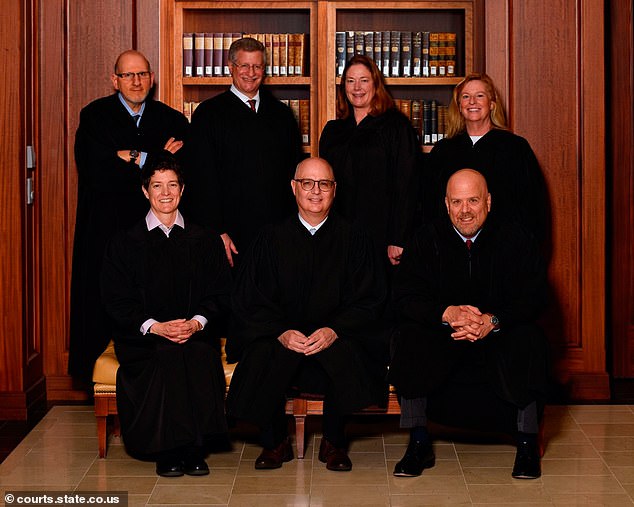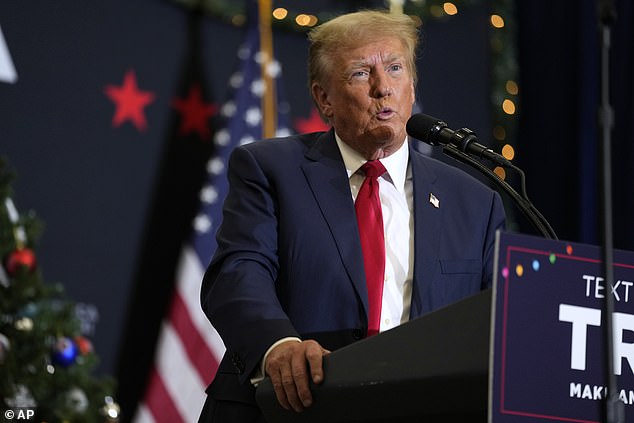ALAN DERSHOWITZ: Colorado's unconstitutional power grab against Trump will trigger Republican retaliation and throw the 2024 election into chaos
The decision by the all-democratic Colorado Supreme Court to remove Donald Trump from the ballot is one of the most undemocratic and unconstitutional rulings I have ever read in my six decades of teaching and practicing law.
The 4-3 ruling claims to draw its authority from Section 3 of the 14th Amendment, which was enacted after the Civil War. The measures were intended to prevent persons involved in the uprising and rebellion of 1861–1864 from running for certain political offices.
But the authors of the 14th Amendment never intended to use it to deny voters the right to decide who their next president would be in all future elections.
To the authors of this amendment, that would have been completely ridiculous.
Consider the historical context of the passage of the 14th Amendment.
At the time, the United States also included confederate states that had recently been put down by force.
Why would Congress want to give power to the former rebel states? If they are given the power to keep candidates off the ballot, they could get into mischief.
In fact, the 14th Amendment expressly provides that “Congress shall have power, by appropriate laws, to enforce the provisions of this article.”
It is clear that this measure was never intended to transfer enforcement mechanisms to individual states and their courts.
The decision by the all-democratic Colorado Supreme Court to remove Donald Trump from the ballot is one of the most undemocratic and unconstitutional rulings I have ever read in my six decades of teaching and practicing law.

It is clear that this measure was never intended to transfer enforcement mechanisms to individual states and their courts. (Above) Justice of the Colorado Supreme Court
How else could this be read?
Furthermore, the 14th Amendment was not intended to circumvent the impeachment provisions of the U.S. Constitution, which also allows disqualification of the vote but requires a two-thirds vote of the U.S. Senate and other procedural safeguards.
Under the Colorado court's power grab, there are no safeguards. Due process has been thrown out the courthouse window.
According to these Colorado judges, a candidate doesn't even have to be convicted by a jury of crimes such as insurrection or rebellion before his rights are taken away.
But even if Trump were convicted in Washington DC or Georgia for the crime of attempting to overturn an election, that would still not justify invoking the 14th Amendment because the text's disqualification provisions do not apply makes on a presidential candidate.
The wording of the amendment only applies to politicians who have taken the oath of Congress — not the presidential oath. The text specifies an oath to “support” the Constitution, which is the operative word in the oath of Congress. The key words in the presidential oath are “preserve, protect and defend” the Constitution.
This is a technical distinction, but combined with the absence of the word “president” and the presence of the words “senator or representative” it cannot be said with certainty that the drafters of the amendment intended to provide for the disqualification of candidates for the highest office in the land.
At least as likely, the framers believed that candidates for that one office should be judged by voters based on their entire record.
Finally, there is no legal precedent for such a momentous legal fiat. If presidential candidates can be disqualified, there must be a clearly established mechanism. It is utterly ridiculous to accept that state courts have the power to initiate an ad hoc, previously unknown process that can be manipulated in a results-oriented manner.

Even if Trump were convicted in Washington DC or Georgia for the crime of attempting to overturn an election, that would still not be a justification for invoking the 14th Amendment because the text makes the disqualification provisions inapplicable on a presidential candidate.
It is this common sense thinking that provides the strongest argument against the Colorado court's decision.
The 14th Amendment does not give individual states the authority to make such important decisions regarding the right to vote for presidential candidates. Rather, it is a time-limited provision, rooted in post-Civil War fears that allies would interfere with the state's reconstruction efforts.
The U.S. Supreme Court will almost certainly review the case and delay a decision until after the Colorado primary on March 5.
But no matter what the Supreme Court does, Republicans will fight back in tit-for-tat fashion.
Outraged – and perhaps even emboldened – by this obvious abuse of the 14th Amendment, some will seek to disqualify President Joe Biden in some states or try other anti-democratic means to limit access to the elections.
The end result will be more disorder in our electoral system during the 2024 presidential election and beyond.
Make no mistake: The Colorado Supreme Court has damaged American democracy and violated our Constitution.
And the American people will pay the price – as the country inevitably becomes more bitter, distrustful and divided.
